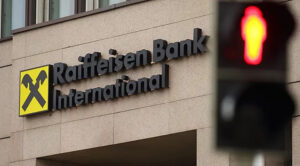
Natalia Gurina, who has been responsible for risk management and problem assets as deputy chair of the board since January 2012, will become the new chair of the board of Raiffeisen Bank (Kyiv), Ukraine’s largest non-state-owned bank, on January 1, 2026.
According to a statement on the bank’s website, the decision was made by the supervisory board of Raiffeisen Bank following a competition, so it still needs to be approved by the state supervisory authorities.
It is noted that Gurina has devoted her entire professional career to the bank and has grown with it since its early years, starting her career at Aval (the bank’s former name) in 1994.
She will replace Oleksandr Pysaruk as chairman of the board, who was approved for this position by the supervisory board in August 2019 and who was first deputy chairman of the NBU in 2014-2016.
“Gurina has demonstrated strong professional and leadership qualities that will ensure the bank’s further development in extremely difficult military conditions,” said Andriy Stepanenko, deputy chairman of the supervisory board, whose words are quoted in the release.
It is noted that Gurina has held positions in various areas over the years, including exchange operations, currency control, treasury, credit operations, portfolio monitoring, and problem loans. Prior to her appointment as a member of the board in July 2007, she was deputy chief risk manager and director of the corporate risk department.
The replacement of the bank’s chairman is planned following the decision of the current chairman, Pysaruk, not to renew his contract for a new term, according to the release.
Raiffeisen Bank is the largest Ukrainian bank with foreign capital. According to the NBU, as of September 1, 2025, it ranked fourth (UAH 239.8 billion) among 60 banks in Ukraine in terms of assets.

Austrian bank Raiffeisen Bank International (RBI) has again failed to sell its stake in its Russian business due to opposition from the Russian authorities, according to Reuters, citing sources familiar with the situation.
RBI attempted to sell part of its Russian subsidiary to a local buyer in order to withdraw billions of euros in profits that were “frozen” in Russia. However, the deal requires approval from Russian regulators, which has not been obtained. According to the sources, Russia opposed the move, fearing that the transfer of the stake to the Russian side could provoke Western sanctions against RBI, thereby undermining important channels of financial ties with Europe.
Sources note that Raiffeisen plays a key role in processing payments for Russian gas, including through the TurkStream gas pipeline, making it an important “financial bridge” between Russia and Europe.
RBI’s press service said the bank is scaling back its operations in Russia and that any deal to sell the business “depends on many regulatory approvals, including the approval of the Russian authorities.”
Since the start of the war in Ukraine, Raiffeisen has accumulated about €7 billion in profits, which are “blocked” in Russia due to the inability to repatriate them. The bank handles significant transactions related to gas supplies to Europe via pipelines — part of Russian exports, estimated to be worth several billion dollars a year.

The European Bank for Reconstruction and Development (EBRD) is providing a risk-sharing guarantee without upfront financing to Raiffeisen Bank to expand financing and provide new loans to Ukrainian businesses in the amount of EUR200 million. The relevant agreement was signed in London on September 9.
“The EBRD instrument will cover up to 50% of Raiffeisen Bank’s credit risk under new financing agreements for businesses operating in Ukraine. Under this mechanism, the bank will provide sub-loans to companies operating in critical sectors of the economy, such as agriculture, industrial production, pharmaceuticals, transport, and logistics,” the Ukrainian bank said in a press release on Wednesday.
According to the press release, this is already the fourth such risk-sharing agreement concluded by the EBRD with Raiffeisen Bank.
It is noted that 20% of the sub-loans covered by the EBRD guarantee will be provided to MSMEs for long-term investments in EU-compliant technologies and green technologies, strengthening the competitiveness of such enterprises in domestic and foreign markets.
Sub-borrowers who meet the conditions will also be able to receive EU-funded technical support and investment incentives, such as grants to complete their investment projects, under the EU4Business initiative. Larger incentives will be provided to businesses and households most affected by the war (e.g., those whose assets have been destroyed, damaged, or relocated), as well as to sub-borrowers that promote the reintegration of war veterans, people with special needs, internally displaced persons, and/or enterprises located in areas most severely affected by the war.
The EBRD guarantee will be supported by partial coverage of first-loss risk received from France and the EU under the Ukraine Investment Framework.
Since the start of the full-scale Russian-Ukrainian war, the EBRD has enabled more than EUR 3 billion in financing to Ukrainian borrowers through 37 similar instruments in partnership with 12 financial institutions.
Raiffeisen Bank is the largest privately owned bank in Ukraine and the fourth largest overall, with total assets of UAH 252.23 billion (6.5% of the system’s total assets) as of mid-year.
Raiffeisen Bank was founded in 1992. According to the financial institution, 68.21% of its shares are owned by Raiffeisen Bank International AG (RBI), 30% by the EBRD, and the remaining 1.79% by minority shareholders.

Agroholding Agrotrade received UAH 120 million in financing from Raiffeisen Bank as part of the European Bank for Reconstruction and Development (EBRD) risk-sharing program, the agroholding’s press service reported on Facebook.
It is noted that these funds will be used to cover seasonal needs: payment for agricultural services, purchase of fertilizers and plant protection products, as well as preparation for a new production cycle.
In addition, the company will attract an EBRD grant under the Human Capital Investment Incentive Program. It will be used to improve working conditions for employees and will be financed by the Kingdom of the Netherlands through the EBRD’s Special Crisis Response Fund.
“This result is the culmination of a year and a half of work with the EBRD. The negotiations were not easy, as our assets are located in the northeastern regions of Ukraine, which are considered high-risk. But we have proven that we are able to work effectively in any conditions, maintaining transparency, discipline, and responsibility to our partners,” said Antin Zhdanov, Deputy CEO for Economics and Finance at Agrotrade Group, whose words are quoted in the press release.
“Our cooperation with the EBRD under the risk-sharing program makes credit financing more accessible for agricultural companies, even in frontline regions. This has a positive impact on the recovery of the economy and the agricultural sector in particular,” said Larisa Bondareva, Deputy Chair of the Board of Raiffeisen Bank.
Analyzing the advantages of the project, the agricultural holding explained that Agrotrade gained financial flexibility and was able to purchase resources for production cycles on time, Raiffeisen Bank received guarantees for part of its loan portfolio, and the EBRD implemented its strategy of supporting business in regions affected by the war.
The Agrotrade Group of Companies is a vertically integrated holding company covering the entire agro-industrial cycle (production, processing, storage, and trade in agricultural products). It cultivates over 70,000 hectares of land in the Chernihiv, Sumy, Poltava, and Kharkiv regions. Its main crops are sunflower, corn, winter wheat, soybeans, and rapeseed. It has its own network of elevators with a one-time storage capacity of 570,000 tons.
The group also produces hybrid seeds for corn, sunflower, barley, and winter wheat. In 2014, a seed plant with a capacity of 20,000 tons of seeds per year was built on the basis of the Kolos seed farm (Kharkiv region). In 2018, Agrotrade launched its own brand, Agroseeds.
The founder of Agrotrade is Vsevolod Kozhemyako.

In January-March 2025, Raiffeisen Bank (Kyiv) received UAH 2.21 billion in net profit, which is 12.3% less than in the same period of 2024, when it amounted to UAH 2.52 billion, according to the financial institution’s website.
It is noted that pre-tax profit decreased by 13.3% to UAH 2.91 billion, while net interest income increased by 3.9% to UAH 4.45 billion, and net fee and commission income decreased by 9.4% to UAH 0.45 billion.
It is noted that the share of interest income from certificates of deposit and income from interest rate swap agreements with the NBU in the first quarter of this year decreased to 13% from 21% in the first quarter of last year, while the share of government bonds increased to 21% from 15%.
According to the report, the decrease in net profit is partly due to an increase in employee benefits expenses to UAH 1.33 billion from UAH 1.10 billion in the first quarter of 2024, an increase in depreciation and amortization expenses to UAH 0.41 billion from UAH 0.32 billion and other administrative and operating expenses to UAH 0.69 billion from UAH 0.63 billion, as well as a decrease in net profit from foreign exchange operations to UAH 0.28 billion from UAH 0.40 billion.
At the same time, net loss from revaluation of foreign currency decreased to UAH 0.12 billion from UAH 0.15 billion, and net gain from operations with financial instruments at fair value increased to UAH 0.27 billion from UAH 0.21 billion.
In the first quarter of 2025, Raiffeisen Bank’s total assets increased by 4.1% to UAH 227.0 billion, and equity increased by 8.7% to UAH 30.43 billion.
It is also noted that on April 22, 2025, the bank remotely held an annual meeting of shareholders, at which it was decided to allocate UAH 0.7 million of the profit for 2024 to pay dividends to the holders of the bank’s preferred shares, part of the profit in the amount of UAH 2.14 billion to the bank’s reserve fund, and the remaining UAH 2.14 billion to be left undistributed and sent to the accounts of retained earnings of previous years.
The bank’s strategy for 2025 envisages business development in a highly competitive market amid the war while maintaining a universal digital model. Raiffeisen’s main focuses are digitalization of services, lending growth, customer retention and attraction, operational efficiency and risk management. In particular, the bank will continue to modernize its technological infrastructure and develop its ESG activities. The priorities will include: expanding lending to individuals and businesses, especially under the 5-7-9% programs, improving the digital user experience, diversifying customer acquisition channels, and cooperating with international financial institutions.
According to the National Bank of Ukraine, at the beginning of the year, Raiffeisen Bank ranked 4th in terms of total assets (UAH 238.9 billion) among 61 banks in the country.

In 2024, Raiffeisen Bank (Kyiv) had UAH 7 billion of new investments in its portfolio, of which UAH 3 billion were for agricultural processing projects, said Yuriy Kozak, Director of Large Corporate Clients, Raiffeisen Bank (Kyiv).
“Since the beginning of the war, customer behavior has evolved. At first, they looked at the operating business, at working capital. In 2023, the demand for investment loans to replace machinery and equipment began to recover. In 2024, we as banks saw a real demand for investment. Clients have already come with new production facilities, new capacities, even new plants,” he said at the Ukrainian Investment Congress in Kyiv on Thursday.
Kozak noted that in 2024, Raiffeisen Bank’s portfolio included requests for new investments worth UAH 7 billion, of which UAH 3 billion was for agricultural processing: starch production, soybean processing, oil extraction plants, bioethanol and biomethane production. In addition, in 2024, a number of clients from the agricultural sector began to build new dairy farms.
He added that Raiffeisen Bank actively assists agricultural businesses and provides loans for 5 years. The bank offers foreign currency loans to companies engaged in export activities, which are quite cheap compared to foreign financing. Speaking about hryvnia loans, the expert noted that they are more expensive due to the political realities in the country, the discount rate and the cost of resources.